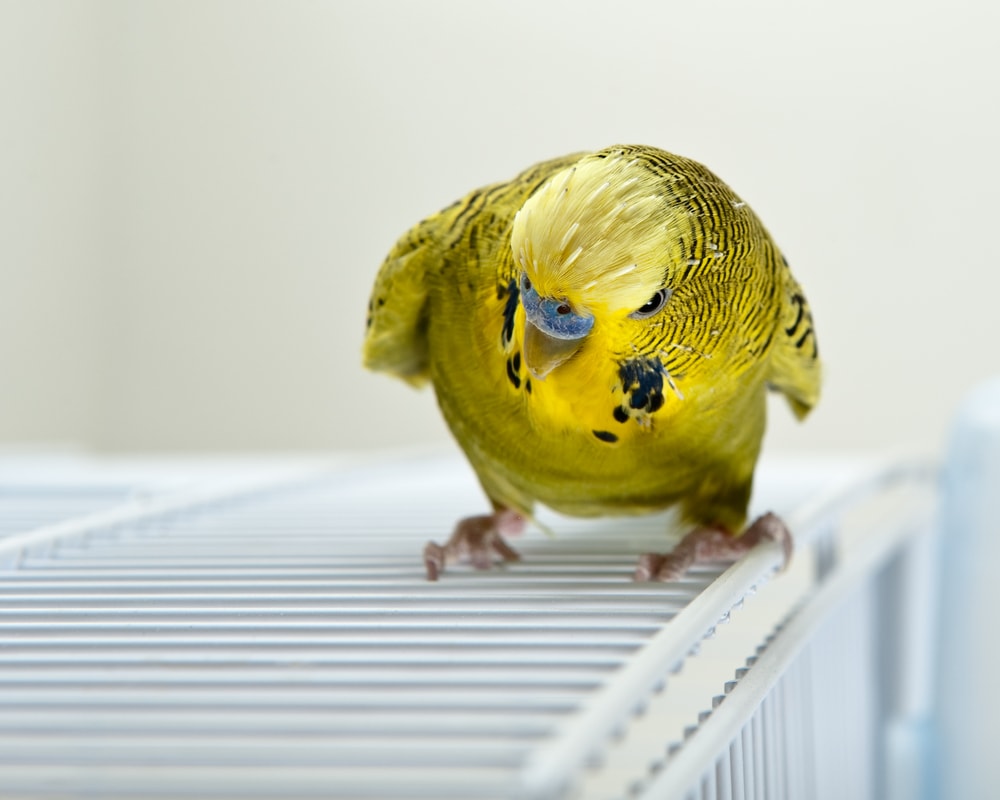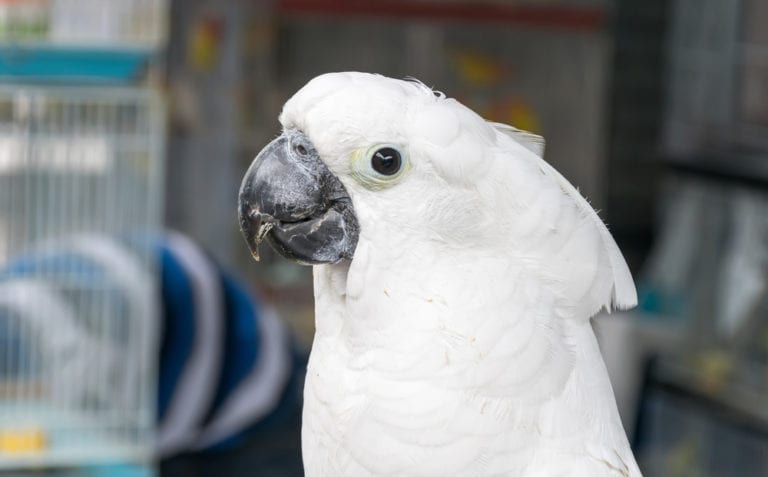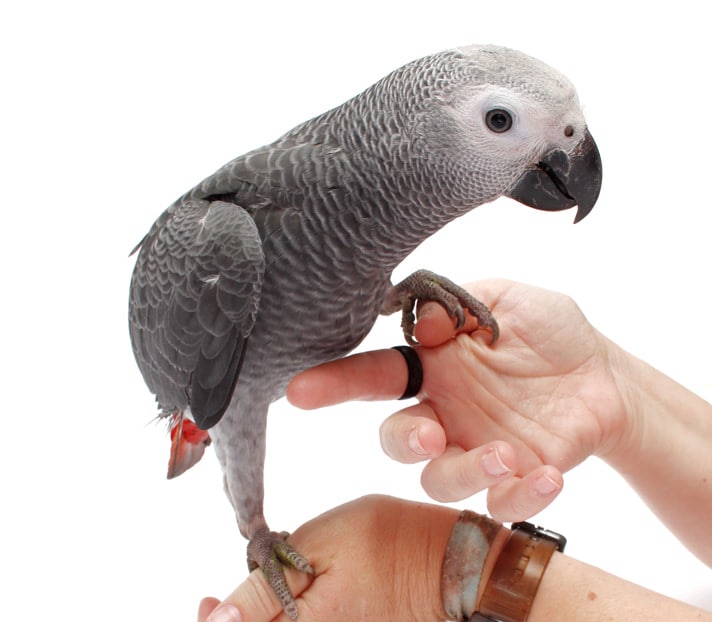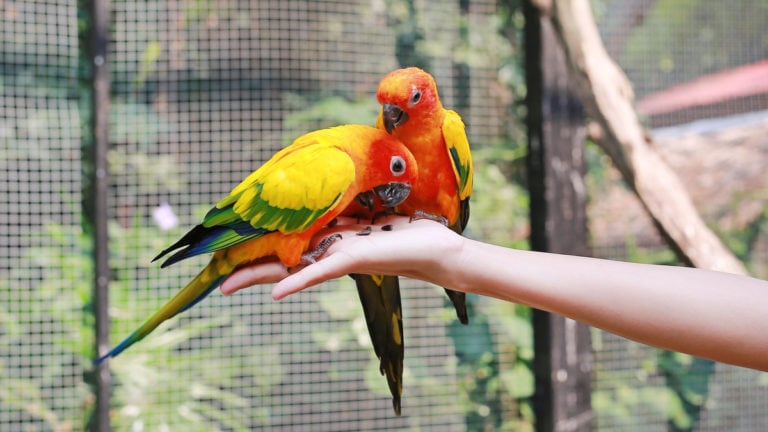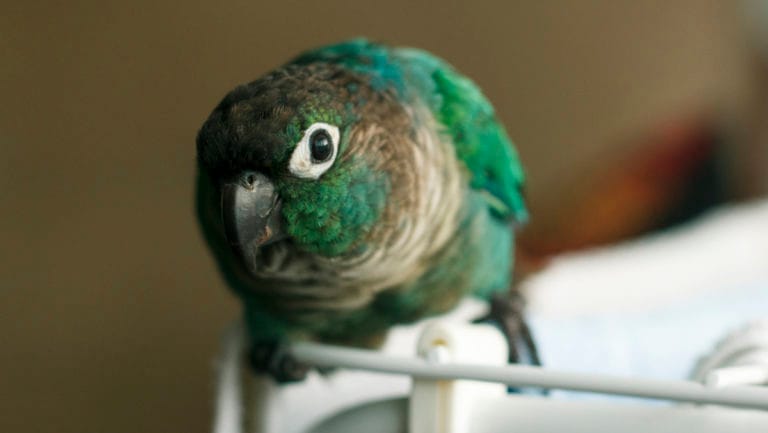Because different techniques are required to alter different behaviors, it is important to properly identify observed emotions in our pet birds and parrots. Symptoms of anger in a pet bird can manifest in numerous ways, which makes diagnosis difficult. This is where knowing your bird’s personality can be helpful.
Some birds, like people, are just grumpy. This is not always the same thing as anger, although a grumpy bird can become angry. Anger is stronger than grouchiness and the bird often appears extremely frustrated. An angry bird might also develop a short fuse, exhibiting little or no patience. The bird might also lash out violently, sometimes waging a full attack upon a person, animal or object.
This can be a tough call to make, especially because some destruction could be normal nesting behavior or an ecstatically happy and rambunctious little parrot doing what he does best — making a mess. One clue to look for is that an angry bird often does not seek positive social interaction, whereas a rowdy, happy little guy will.
Some apparent aggression might actually be territorial behavior, in which the bird defends his favorite person, place or object and attempts to drive all others away. That is not true anger, unless he is not taught that he cannot do this and eventually becomes angry because everyone is violating “his” property and not paying attention to his clear messages to keep away.
An angry bird often spends much of his time alone. He might be tense and sit relatively still, or he might tear around the cage destroying things. He might scream or be vocally or physically confrontational. He might destroy his feathers, often in a methodical and deliberate manner. However, taking the aforementioned things into consideration, the most accurate way of determining if a bird is angry is the fact that he will often just feel angry to those who know him.
Reasons For Bird Anger
What kinds of things make birds angry and what can be done about them? Well, what situations make you angry? The reasons for problem behaviors are diverse, and pinpointing the cause is an important component of the behavior modification and healing processes in both humans and animals.
If it is not appropriately addressed, the symptoms could go into hiding only to reoccur at a later time and in a different form than their initial manifestations. Unfortunately, we can never be exactly sure of why a bird is angry. After all, we often don’t even know why people around us are angry. But we can still do our best to determine the most likely causes and go from there.
An angry bird might suddenly lash out for seemingly no reason. Sometimes, he just got up “on the wrong side of the perch” and simply does not want to interact at that moment. Or, he might actually be tired, or perhaps someone around him behaved in a way that he perceived as threatening, in which case, he lashed out to tell the person to just leave him alone because he was tired or felt threatened.
This “sudden” reaction by the bird usually occurs after the human has failed to notice a myriad of tiny clues that would never be missed by another parrot. These include a slight change in the size of the pupils of the eyes, a barely perceptible shift in body language or the way the feathers are held against the head or body. Even larger hints, such as the bird walking away from his favorite person are often ignored by humans. These types of behavior are usually ephemeral and a direct result of some interaction. Some are actual anger and some are simply warnings.
If a bird calmly walks away from overtures to get him out of his cage and is then pursued until his patience is gone, he’s likely to become angry. Anger can also be a reaction to the introduction of a new family member — human or animal — especially one that is fawned over by his favorite individuals.
Sometimes, anger is part of the grieving process. Think about an emotionally rich creature who is experiencing very strong, maybe even crippling emotions and who is incapable of expressing those feelings.
For example, we are thrilled to invite a new pet bird into our homes; however, even if the bird has been taken from a bad situation into a loving home, they still might harbor resentment or anger regarding the move. Although this might seem unreasonable, at first, it is important to note that this is also frequently seen in human children under similar circumstances. It is the classic case of feeling safer with the situation you know instead of risking the situation you don’t know. Sometimes, a change in the environment — a roomier cage, new perch or changing the cage location — garners similar reactions.
A frequent cause of anger in pet birds is when their people leave for extended periods and then, after a week or two of the bird’s worrying about them, they arrive back home, blissfully unaware that their friend is now furious with them for being away. This often results in an angry bird stomping off when the person tries to coax him out of his cage. Some birds might bite upon the human’s return.
Prevent Anger In Pet Birds
Prevention is our strongest tool when working with behavior in humans or animals. Be considerate. Many birds do not like surprises, especially those that strongly impact their lives. Anticipate events or situations that might trigger anger in your bird and diffuse them by preparing the bird ahead of time. This might include making changes in a gradual manner and making them seem exciting and fun by talking about them ahead of time and during their manifestation.
An excellent example of this is avoiding possible anger or jealousy by preparing your bird for new human or animal family members. Let your bird see baby cribs and all other paraphernalia essential for a new child. In the case of new pets, let him see food and water bowls, beds and toys before the new family member shows up. Some people actually use dolls or stuffed animals as part of this process, talking to them as they will their new family members. Talk to your avian friend about who is coming and remind him that he is still the most important and wonderful bird in the house. When the new family member arrives, do not hold him/her and then bring him/her to your bird. Instead, hold your bird and take him to the new individual.
When rearranging furniture, move only a piece at a time, or move it only a short distance, at first. Let it sit a couple of days and move it some more.
If you are leaving for an extended period, tell your bird that you are going. Count out the days on your fingers and tell him who will be caring for him. Reassure him that you love him dearly and will miss him greatly. Have whomever bird sits for you count down the days before your arrival. Don’t laugh until you’ve tried it. It’s one of my most popular suggestions and is highly successful.
Address Bird Anger Issues
If it’s too late and your bird is already angry, address the cause, if possible. For example, if his anger seems related to changes in the environment, temporarily change things back to the way they were.
Time is often the greatest healer of anger, for both humans and animals. If your bird’s anger is a quick reaction to something you have done to offend him, simply apologize and walk away for a while. Often that gesture will suffice.
If your bird’s anger is in reaction to a new animal or human, apologize to him and then reintroduce everyone more carefully, while cuddling your avian friend.
If you have been away, apologize for not telling your bird ahead of time — be truly repentant — and tell him you love him more than any other bird on the entire planet. You really should have told him ahead of time, and it’s your fault he’s upset so lay it on thick. It might even take a couple of days for him to forgive you.
Anger can be a direct response to the way that the bird is being treated by the people around it. Many angry birds have been teased by people who either live in the home or who are visiting. If a bird is called ugly, stupid or funny looking, it understands the tone of voice and the emotions that are carried in those kinds of words. They do not like being called names any more than their human counterparts do.
You are your bird’s only champion. He needs you to stand up for him and to not allow him to be teased. Anyone who would tease an animal is not good friend material anyway so, if they are offended and leave, their absence will only make your life better, as well.
If your bird is grieving, then grieve along with him. Be sympathetic and compassionate. Let him know how much he is loved and how important he is to you. Everyone is different regarding how long it takes for grief to heal. Time, compassion, and loving friends can make the process bearable while the emotion runs its course.
If you have an angry bird and the foregoing hints do not work, the problem will need to be addressed on a one-to-one basis. Contact a qualified companion bird behavior consultant to set up a customized behavior modification program for your particular bird.
No one likes being angry and our pet birds probably feel the same way. With a little advance planning, we can prevent most anger from occurring, and with some love, compassion and behavior modification, we can eliminate existing anger. It’s the least we can do for our best friends, isn’t it?
Posted By: Chewy Editorial
Featured Image: Via Thomas Skjaeveland/Shutterstock
Share:
